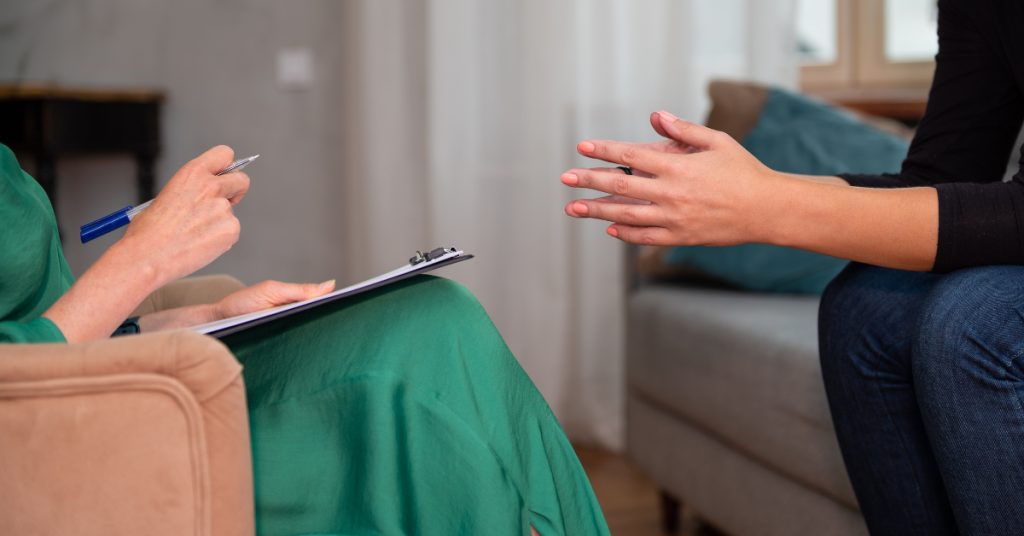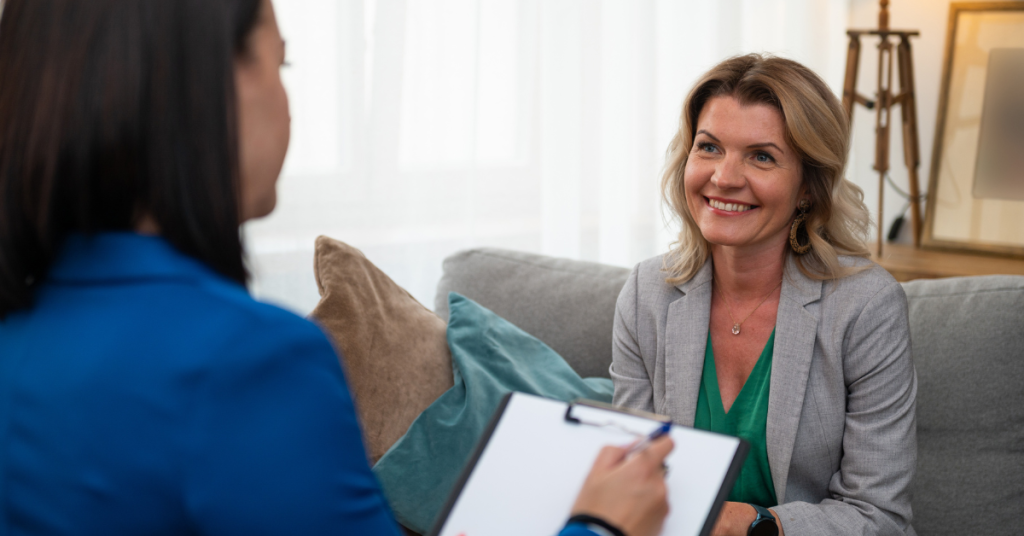Welcome to Hope for Anxiety and OCD, episode 107. For anyone new to our show, we are all about reducing shame, increasing hope, and developing healthier connections with God and others. I have with me today on the show a licensed mental health counselor and certified integrative mental health professional, Diana Rice of Through the Valley Therapy in Florida.
Carrie: Are you in the Miami area? Is that right?
Diana: I’m in South Florida.
Carrie: Okay. Today, we’re going to talk about adverse childhood experiences. People may have heard them referred to as ACEs. I’m talking about how these things impact us, which is really relevant for conversations surrounding anxiety and OCD.
Diana: I wonder if you could tell us a little bit about your personal story in terms of just what led you to be the counselor that you are today.
Diana: Wow, I could say I could blame my middle school, my Broward County middle school that I went to. Honestly, my father’s family kind of kept me here. My mom is an immigrant from another country and my dad is as well.
I’m originally from New York, and when I came to visit one summer, they kept me, so I was in middle school and then I started middle school here. My mom ended up coming back, but at that time, she didn’t know her rights. It turned out for God’s glory, of course, because here I am now. But in seventh grade, I became a peer counselor.
I think that’s where my love of helping others plus, my mother’s only child and I have older siblings, but they’re from my dad’s side. I just wanted to help people. I could see now back in the past like I had to disentangle what was I trying to heal because of my background and what is actually my calling, how my personality is and what the Lord has given me to do in this place we call earth.
That’s where it all started, and in high school, I was a peer counselor. I remember they interviewed me in the yearbook and asked,, “What do you want to do when you grow up?” I’m like, “I want to be a psychologist.” That time, I was already doing the wrong thing. I wasn’t a Christian then. I was raised Catholic with Santeria, which is a religion. You guys could look it up, but be aware. It wasn’t as bad as you’ll see if you do look it up, but my grandma was a medium.
Carrie: Oh, okay. Wow, so that’s like two different worlds intermingled there.
Diana: Yes, so I had that kind of spiritual trauma along with other things. I know that we’re talking about ACE, adverse childhood experiences, and my score is a six. I did not know these things when they were happening because most of us when we’re growing up, we think that’s just the norm of what’s happening. Everybody must be going through that plus our brains aren’t fully developed at that time.
Carrie: Right. I think a lot of people are just like, “Well, that’s just kind of how it was. That was the water we swim in. That’s what maybe all the neighbors were going through as well. Until we get outside of our box or bubble of how we grew up, we don’t really know that things can be different or are different for other children and teenagers out there.
Tell us a little bit about how you got interested in the ACE study because I think when you and I had chatted before, you said you felt like it was kind of a life’s work for you, just really understanding this and applying it in your counseling.
Diana: When I was in college, we have to do our practicum and our internship. I spent a year in a Broward County school that was cognitive-behavioral therapy-based. It is sort of an alternative school, but the students that were there, they were from other schools sort of got kicked out or they needed help and they had to be seeing a psychiatrist. At this school, that was my internship and I was basically for that year, the only intern, but there were like eight other therapists, a psychiatrist, and a couple of psychiatrists.
It was probably one of the best educational times of my life for that year. I learned a lot of what not to do as a therapist, the red tape and the understanding of insurance, sorta there. So basically I was just learning from a lot of different modalities of how people practice back then and that was in 2004. It was almost 20 years ago before social media and it was at school. I was mostly teens. I mean, we had middle school and I think there might have been an area of elementary, but most of my clientele that came to me were teenagers. I realized I was there and I’m not the psychiatrist and I was getting frustrated because it was basically they came to me and a fat file of the student or whatever it is that follows them along the whole system. I’m like, “I don’t want to read it. My supervisor would be like,”Yyou have to read it. That’s your job. I’m your supervisor.” I’m like, “I know, but then you’re giving me this.” I’m going in already kind of with a judgment on the student. I’m from Broward County, so I was a product of the Broward County school system.
I have that little bit of that sass. Basically though, I was seeing like, why aren’t we listening to these students? I’m seeing these things that are happening and they’re angry and they’re frustrated or they’re not being heard. I ended up taking what Carl Rogers talks about unconditional positive regard and I was new. I was just new to the game. I just basically started listening and questioning and then I would go home and go to my library and research or go back to my college and ask my professors. I was just always asking why, why, why would we do this back then? I think the DSM might’ve been three or TR or something like that. I’m like, “Why do you keep telling me this book my Bible?” That’s what we’re taught in a public secular college when it comes to licensing and everything. And then I would open it up and see all the names and I’m like, no offense. Why are all these white people the ones that are telling me what to do?
Why are we not taking into consideration the cultures? Or the understanding of other people’s backgrounds. I was questioning and questioning. Some of my professors loved, that I was questioning things.
Carrie: And some hated it.
Diana: Oh, some of them were, but I was used to that already because that’s how I’ve learned most of my life, even in high school and stuff. Just like questioning why. That’s just how I still do that to this day.
Carrie: Right, and very valid questions. I think psychology was based off of a bunch of white men at the end of the day. It started, that’s not where it is now, you know, things have progressed, but there’s still a lot of that bias in a lot of the research materials and things of that nature in DSM.
Back in the 90s, just for anybody who’s not familiar with the ACE study, adverse childhood experiences. Kaiser Permanente, which is an insurance company that’s more on the west coast of the U. S., if you’re not familiar with them, they decided they’re going to do this study and try to figure out, we have these people that have chronic health issues that are obviously taking a lot of money to take care of.
People with addiction issues, people with high blood pressure, diabetes, all of those chronic conditions that we think about. They wanted to figure out what makes some connection points between their physical health and their mental health and what they found through questions. They had, I think, 10 questions on there.
Diana: I have the questions in front of me and it’s basically simple and people don’t understand what it does. It makes you understand things that you never do. That’s the way I like it in a holistic practice because we really touch on some stuff and it does get utilized in my practice anyway. In a way that’s like, whoa, but they don’t ever see the correlation.
The 10 questions are like this, “Did a parent or another adult in the household often swear at you, insult you, put you down, humiliate you, act in a way that made you afraid that you might be physically hurt? And then it keeps going. “Did a parent, or other adult in the household often push, grab, slap, or throw something at you ever hit you so hard that you have marks or were injured?”
I don’t know, I know these could be trigger questions right now for your audience. I want to be careful because now I’ve realized like, okay, because I utilize it so much, every client has to fill this out when they come to me. I’m realizing now that I got to be careful because your listener might never have heard these and they’re going to be like, because if we end up saying all 10 questions and they say, “Oh, yeah.I have seven” then what do we do here as therapists?
Carrie: Yes, people can go look them up online and I’ll link them. Even something like the divorce of your parents is on there and that’s pretty common in today’s day and age.
Diana: Or drinking or alcohol. Anybody had a mental illness or was depressed in your household. “Did anybody go to prison?” It is questions that are basic, but when you put all 10 of them together and you start seeing the scoring, anything higher than a four, I think is cause for a little bit of concern. The higher the score, of course, the more you going to have to be aware. It’s an awareness. It’s not like you’re doomed.
Carrie: Right. It’s just a look at how that connection is, and they found that people who had scores of four or more ACEs were more likely to have these chronic health issues, the high blood pressure, the diabetes, addiction issues, and it was very significant. It was kind of like the graph was small at 1, 2, 3, and then jumped when it got to 4 and above. It’s a very eye-opening, and it’s not a new study, but I think a lot of doctors don’t take these types of things into account. A lot of individuals who have chronic health issues or chronic anxiety or chronic insomnia don’t take these types of issues into consideration because, like we were talking about before, It was just kind of how they grew up.
It was the water they swim in and they don’t always identify with the word trauma or abuse. I think that’s why some of those questions get very specific. Because if you say, did you experience physical abuse in your household? Someone might just think, well, that was discipline, but yet they ended up with marks, or they ended up getting hit in ways that are clearly not disciplinary.
Diana: What I see in my practice for the last 20 years is that It is a cultural thing at times. I also understand because I use a lot of Myers Briggs too. I try to come up with free assessments so we can have a holistic picture. Say you have this young person who is an introvert and is nervous by nature, like, and that’s okay. All of a sudden the father comes home drunk and is yelling. It doesn’t even have to put hands on, but, your nervous system just gets turned on. All these layers of emotional wounds, that’s how I explain it to the teen or the young adult or the adult that’s come to me is that we have emotional wounds.
We all experience these emotional wounds. The intergenerational trauma. A lot of people want to call it intergenerational sin, generational sin or whatever it is that’s happened. But if we don’t deal with them, then this is why symptoms happen.
Carrie: Absolutely. Those types of things that affect our nervous system and get us into that fight, flight, or freeze energy on the regular basis, that’s almost like teaching our brain for that fire alarm to constantly go off when it’s really only meant to go off in high danger, high-stress situations so that we have that energy to fight, flight, or freeze.
When you’re in a chronic situation like that, and like you said before, your brain is still developing. Now we’re affecting kind of how the brain is developing in these processes with children and teens. Similar to you, I started out working with children and teens, not in a school setting, but in a home setting, trying to prevent them from out-of-home placement.
When I first went into it, I thought, what’s going on with these kids? What is the deal here? Why are they acting up so much? Was it something about how they were raised? I didn’t know. Do they just have no structure in their home or no discipline? But then you start to peel back the layers and you start to look at, we had a, oh, I’m trying to think of what the assessment was.
It wasn’t an ACE assessment, but it was a trauma inventory, and it’s got a really long acronym, but we would go through that with every client and ask about, have you ever experienced this, homelessness, times where you didn’t have enough food, all kinds of different experiences. Has anyone ever hit you? And then you find out all kinds of things that have happened – bullying, abuse that they’ve experienced, and then you go, “Oh, these kids aren’t bad kids. They’re not behavior problems. They have been through an enormous amount, and their nervous system, like, does not know how to process or handle even day-to-day situations.”
Diana: On fire, that’s what I say. That’s inflammation and when we understand the science of the mind and the body all together, it’s places of yourself that are inflamed. If your gut is inflamed, you start feeling it in other places. The same with the brain. If your central nervous system is always protecting, I mean, think about back in the day, a long time ago, thousands of years ago, when you have a sabertooth tiger running after the caveman, that’s the alert.
Your adrenal glands are going squirt, squirt, squirt with chemical and it’s fight or flight or freeze or fawn. If you’re on, but the thing is with the chronic, like you’re saying, if it’s happening every day, your system just learns to stay on. And then people that have a safe environment or healthy foods, or they don’t have to worry about resources or gang life or abusive home settings.
They don’t have that understanding and then they’re judging it now. For us therapists, if you’re a therapist listening to this, this is something that can revolutionize your whole practice, understanding the holistic approach to mental health and especially with the ACE, understanding the neuroplasticity and the science behind that, I mean, the brain and the gut connection, things like that.
“If I did not learn these things, I think I would have been, I was a wreck. I mean, I was smoking pot. I was drinking alcohol all through my teen.” And that’s why they’re like, they’re just teenagers, but if we get to understand the why, why are they taking it so personal? Why are they popping off? I think we’re going to talk about internalizers and externalizers.
Carrie: Yes, let’s go into that. Your externalizers are the poppin’ off kids.
Diana: Yes, the Poppin off kids. The ones that are people see and they think that they have a chip on their shoulder, like, “What you lookin at”, or whatever it is. If you take those personal, if you’re working with adolescents, or you have one, and you’re taking it personal constantly and saying, well, they’re just teenagers, they suck, or whatever it is or instead of taking a step back and going, “Why are they poppin off? Why are they punching the teacher in the face?” And those are the students that I worked with. I worked from there, and then I worked in a non profit organization that went into the houses, too, into the inner city homes, so I was seeing things we are the richest country and we’re allowing people to live this way.
I don’t get it. I get it, but I don’t. It’s such a system. I’m not even gonna go there. But you have those that externalize, which they’re fighting. They’re angry. They’re the little kid who might be diagnosed with ADHD. They might be diagnosed with a thousand different things and on five different medications. We don’t realize at home they’re eating Captain Crunch and Mountain Dew for breakfast. We don’t see this whole picture because we have to, I get why in the system, if you’re responsible for thousands of kids in one school, you can’t do what we’re trying to do, individualizing therapy for each, so you have to come up with answers quickly so you could keep the fire down.
Carrie: Yes. Absolutely.
Diana: Those are the externalizers, the ones that you see that are angry or cussing or upset or wanting to fight and you feel it. The internalizers, they’re usually the cutters. They’ll stay in their room all day long playing video games, or they’re doing other things that they shouldn’t be doing. They’re the shy ones, they’re the suicidal ones.
Carrie: Right, they just keep everything inside and bury it as much as possible and even occasionally they may blow up at some point, but it’s usually against themselves, like you were saying.
Diana: Some of them will do both, depending on what’s going on in their own system, like in their own body, their vessel. It depends on how much a human being can take. Each one of us only has a threshold. We only have a certain amount of bandwidth.
Carrie: I’m sure it drove you crazy like it drove me crazy that the trauma wasn’t taken into consideration, so then we were just looking at symptoms. We were trying to match people up with the DSM and trying to match people with medication.
Therefore, there was a turning of students who got diagnosed with ADHD and then bipolar disorder. That’s what we saw all the time.
Diana: ADHD and bipolar borderline. I’m trying to think there was one more. I mean, when I had anxiety and depression that year. I came and I think I am quite fine, I’m in private practice now. After that, when I was working at the nonprofit, I took a little break because of a certain situation that happened personally in my family, and then I went into a different career. After the Parkland shooting, and the Stoneman Douglas shooting in 2018, I had a couple of parents ask, “Hey, are you still a therapist?”, and I’m like, “no, I’m not.” And then little by little, the Lord kept saying, “You’re going back. I’m like, “no”, but I see now since 2018, everything. I’m like, Okay, I’m just going to be obedient. This is of service for you. It’s a calling. I’m grateful that I do get paid for it and I get to help others learn about it. When I went back, I ended up in a school being the crisis intervention counselor serving about 200 students and I was the only licensed therapist there.
Carrie: Wow, that’s a lot of students to take care of. What hope is there? Because this is hope for anxiety and OCD, what hope is there for individuals who’ve had these types of experiences?
Diana: There’s so much hope. Listen, I am one that had these types of experiences. Like I said before, I have an A score of 6. It’s reframing what has happened and understanding, but getting the help and doing the work. Because some people do the healing process, they get stuck in the victim. And they don’t know how to get out of it because it’s been their life for so long and they might be surrounded by other humans in their family or in their community.
That’s all they know as well, so it’s understanding there is hope and it starts with you understanding you being that curious observer of yourself watching YouTube videos on CPTSD. Reading books like Dr. Gabor Maté’s book, The Myth of Normal, or The Body Keeps the Score by Dr. Vessel Van de Kock, or CPTSD, From Surviving to Thriving by Pete Walker.
There’s so much information out there. Or listening to podcasts like this, saying, Hey, no, there’s hope and understanding the science of your brain. Neuroplasticity is a real thing. They’re finding it out there in more and more information on the brain and how rewiring your system you can do it. I have done it.
It took a lot of hard work to grieve my childhood to learn to forgive those that hurt me and it’s not only my home. It’s understanding. We’re all raised in a village.
Carrie: Yes.
Diana: We’re all in a village now. If you’re hearing my voice, you’re part of a system. You’re part of a village, but we were also raised by one.
Some people might hurt you which can cause anxiety and depression, which are symptoms of numerous things. Finding out that you are not anxiety and you are not depression. These are just things you’re wrestling with or struggling with. I like wrestling better because wrestling means that you could get up on top of it.
When I use the word suffer, I don’t like that too much because it’s like, “Oh, I’m suffering. Oh, what was me?” To me, I had to go through that part. I was grateful for EMDR. There are modalities that can help internal family systems, EMDR. I do cold plunges now. I do sauna work, infrared sauna, acupuncture, and things that have been around for thousands and thousands of years that are Westernized medicine. It doesn’t utilize because it’s either free or they can’t make money off of it.
Carrie: The cold plunge. How does that work?
Diana: I just started honestly last month and you go into like 40-degree water and I’m up in 90 seconds. I started off at 30 and I thought it, but it was the weirdest, craziest, most amazing feeling I ever had.
I do Wim Hof breathing. Wim Hof, you should look up his story. I started with the breathing techniques because these things are not taught in churches. They’re not taught our profession either much, and a lot of people see them as woo woo or new age, but I’m like, “No, the Lord made breath.”
Carrie: There are certain breaths that I know, like from yoga. There are certain ways to breathe where you can warm up your body or cool off your body. So are you trying to warm up your body like in those situations or no, you’re trying to take your temperature down?
Diana: Are you talking about breath work or with a cold plunge?
Carrie: With the cold plunge, are you trying to breathe a certain way while you’re in there?
Diana: It is actually trying to wake up my mitochondria to healing. It’s also understanding your mindset. We have a fixed mindset, many of us, especially if we wrestle with anxiety because I do, I wrestle with anxiety, honestly, like I can’t drink coffee. I have to do the work and I have to be okay. Kind of like an alcoholic shouldn’t be drinking alcohol.
Carrie: Right, yes.
Diana: Someone like me that has anxiety and wrestles with it. I have to do the work and understand like, “No, I can’t touch that substance because that substance is going to make my anxiety worse or depression or whatever symptoms being exasperated by whatever’s around you. With the cold plunge, I am trying to, first of all, wake up myself and at the same time realize that I have the power in my mind to do this. Tthat is the rewiring of the brain that is creating new neurons to be able to connect.” Whatever fires together wires together.” That’s what Jim Quick says.
Carrie: Right. Yes.
Diana: I love to listen to and it’s true. If I would have stayed like, “Oh my gosh, I’m going to be a pothead of all my life, or I’m going to be depressed, or I’m never going to be able to be around my family because they trigger me too much. I had to rewire my brain. I have also been diagnosed with SERS, Chronic Inflammatory Response Syndrome, but I also know it’s because of how high my ACE score.”
It’s an autoimmune, so I have to do the things to keep that fire down because it’s inflammation. And I do the work and it was trying to shrink the inner critic because you grow up in that kind of environment with a high A score. It’s constantly like, I’m not worth it. It’s attachment issues,
Carrie: Putting yourself down a lot from things that you’ve heard from other people and just kind of repeating those things to yourself.
Diana: Because it’s been chronically done constantly, you start believing and that is something I had to realize with my walk with the Lord. To me, guilt and shame, because that’s what most of us who have anxiety, a lot of these diagnoses come and they’re really in guilt and shame. Guilt and shame is from the world. Conviction comes from the Lord.
Carrie: Right. That’s good.
Diana: It’s different. If you’re going against God’s word, then of course you’re going to get convicted.
Carrie: That’s a good thing.
Diana: Yes. If you’re feeling guilt and shame constantly and you’re blaming God and you’re not understanding, like, where is that voice coming from?
Who said those things? And you start recognizing those voices, the inner critic, and then you just sit with it because a lot of people that have anxiety, that I’ve come to find out in this 20 years I’ve been doing this, is they’re storing these emotions in their bodies, so they’re either so depressed and sad about it, and they’re just giving up with no hope, or it is stored so deeply that it’s like when a deer gets hit by a truck, or any animal.
Carrie: They’re sort of shaking.
Diana: That’s our nervous system, which causes the anxiety, or the OCD. I still struggle with that too, and I have to realize, I got bad news. This is an example that happened lately. My sister was put in hospice. My husband, because he has done his work with me and understands he or she is starting to clean everything and make everything perfect. She took everything out of the gap because that’s what I did. Then he took me and was just like, “Honey, you’re going to have to go see your therapist. Please calm down. I could tell because it happens.”
Carrie: Fall back into those patterns. I really like what you’re saying on a spiritual sense of that there’s a verse that talks about work out your salvation with fear and trembling for it’s God that works within you and you’re talking about really partnering up with God and the Holy Spirit to do the work, not just kind of sitting back and being a passive observer and say, God, just come over me and just fix all the brain cells, just make them all like wired together the way they’re supposed to and heal up this yuck stuff that happened to me.
You’re like, “No, I’ve actually sought the Lord, but I’ve also gone to counseling and I’ve also done these other healing modalities and read a lot or watched a lot of videos and really absorb the Information because knowledge is really helpful in these types of things and it does help reduce some of the shame so that you’re not thinking why in the world am I responding in this way?
Why in the world am I acting like this? When you understand, you can peel that back and say, “Oh, okay, now I get it. Now that I get it, I can start to take a step towards change.” If a lot of times we don’t understand what’s going on in the first place, it’s really hard to make changes into it. If we don’t sit with it and go, “Oh yeah, this is what happened to me. This is how it affected me. This is how my relationships have gotten so hijacked for the last 10 years.”
Diana: We have to remember as believers that Satan’s only reason is to steal, kill, and destroy every relationship that you have, including and especially the one with yourself.
When you notice that and you realize, like, this is why I really am a mind, body, spirit connecting therapist here. When people come to me, they understand my position in Christ. I do not force. I’m not a biblical counselo. People argue with me all the time and we all have our journey. To me, what has worked thus far with people. I have quite a few people with a lot of spiritual abuse from church where I have to disentangle because some people don’t understand they grew up and was forced into some kind of say religion or whatever it is. And then they come to me with this hatred towards God and they want to deconstruct. I’m there going, okay, I think you want to disentangle and understand your situation that happened in ACEs is not only in inner cities, I mean, there’s higher scores there because they have fewer resources. It’s just how our system in this society has been for so long. And this is. In the last three or four years, that’s the uprising that we’re feeling and people misunderstanding.
That’s why I encourage those to educate themselves, but it starts within ourselves. Psalm 139 verses 23 and 24, search me, Oh God, and know my anxious thoughts starts with us being responsible for us. Despite anything that has happened to us. That’s the power we have.
Carrie: Towards the end of the podcast, I like to ask every guest to share a story of hope, like a time where you received hope from God or another person.
Diana: Wow. I could actually talk about this morning. I had a client, mostly my clients gave me hope due to them doing the work and seeing the progress. I’m very grateful for that. Just like this morning, I had a client that came to me two months ago and she was in a very, very bad place. When I say very bad place, it was just, I don’t know if I could. It takes energy. I think the listener needs to understand we’re humans with our struggles and we care about our clients, or we would not be in this. And we care about them, not just for the hour or 90 minutes we have them.
Carrie: True. Very true.
Diana: We’re trying to find other ways to help them. I’m in a lot of prayer. If you come to see me, I’m praying for you before you come in. We pray together and then when they leave, I pray, “All right, Lord, what do I have to do for the next session? Or what do I do next?” This person came in and I’m just like, I don’t know if I can help them. I can’t after crying out to God for a while.
I’m like by this time, if I can’t help and she came in today and I was just blown away with how much progress it was amazing. It’s like every time I want to quit, I honestly want to retire or go back to the other career I was at because this is heavy work for us.
Carrie: It’s not easy.
Diana: It’s not easy. It is a calling because I’m sure that if you are a therapist listening, you did not get in this for the money. If you got in it for the money, then your heart is not in the right place to be a therapist. If you’re coming in thinking you’re going to make a lot of money, then you’re not seeing your client as the human that we should be seeing them as.
To me, I’m talking to my husband, “Shiver. I’m older now. I’ve done some time already.” The second I think that, a client comes in and boom, something out. I’m like, “All right, Lord. Okay. I hear you. All right.” He reminds me, it’s not about me. It’s not even about the client. All of that price and utilizing our gifts and talents, which each one of us have, and it’s just getting in tune with that. The only way to get in tune with who you are to heal is to sit alone and be still with the Lord.
Carrie: I love your office too. For those that are just listening, she has lots of plants all over her office and natural lighting is a very warm and inviting therapy space. I really like that. I’m still working on my office, I moved into it a few months ago, and it’s just not quite where I want it to be. There are still some tweaks that need to happen, but I’m going to get it settled, and it’s going to be great when it gets done.
Diana: You have to send me a picture of it.
Carrie: Okay, we’ll do. Thanks for being on the show today and sharing your wisdom with us.
Diana: Carrie, thank you for having me.
___________________________________
Carrie: I loved interviewing Diana because it’s always great to find another therapist with a similar heartbeat about treating trauma and letting people know that is possible for them to have a better life moving forward, even if their background has been kind of rough.
As some of you know, I do EMDR intensives with clients who are looking to process trauma in a short, condensed amount of time, instead of having to spread that over weeks and weeks and open up issues and close them up. If you want more information on that, feel free to check out my counseling website at bythewellcounseling.com. I am also working on longer intensive packages specifically for clients who are dealing with the intersection of trauma, childhood wounding, and OCD. If any of that is of interest to you, definitely contact me and I would love to share more about it with you.
Christian Faith and OCD is a production of By The Well Counseling. Our show is hosted by me, Carrie Bock, a licensed professional counselor in Tennessee. Opinions given by our guests are their own and do not necessarily reflect the views of myself or By The Well Counseling.
Until next time, may you be comforted by God’s great love for you.









